Defeated in Gaza, Israel can't repair myth of invincibility with barbarism in Lebanon: Pezeshkian
President Masoud Pezeshkian says the Israeli regime has been defeated in its genocidal war on the Gaza Strip and now cannot “repair its myth of invincibility” through resorting to barbarism against Lebanon.
The president made the remarks in New York on Tuesday, addressing the 79th session of the United Nations General Assembly.
He was referring to the regime’s failure in the face of the Gaza-based resistance movement Hamas in the Palestinian territory and the escalation of the regime’s attacks against Lebanon since the onset of the war.
Iran President Pezeshkian: Israeli regime has been defeated in Gaza. pic.twitter.com/Lfr8ZLttG1
— Press TV 🔻 (@PressTV) September 24, 2024
As part of the escalation, the regime carried out extensive airstrikes against southern and eastern Lebanon on Monday, killing at least 569 people, including 50 children and 94 women, and wounding 5,000 others.
The attacks came less than a week after the regime killed 38 people in an attack on a residential building in a southern suburb of Lebanon’s capital Beirut. A couple of days earlier, it had also detonated thousands of booby-trapped pagers and walkie-talkie radios across the country, killing at least 39 people and wounding 3,000 others.
Pezeshkian said, “The insane Israeli barbarism in Lebanon should be stopped before setting the region and the world on fire.”
“Naturally, the blind and terrorist crimes of the past days and the extensive aggression against Lebanon that shed the blood of thousands of innocent people will not remain unanswered,” he added.
“Those governments that stand in the way of cessation of this terrible catastrophe and still call themselves defenders of the human rights, have to bear the consequences [of these atrocities],” the president noted.
Pezeshkian, meanwhile, pointed to the regime’s killing of more than 41,000 Palestinians, mostly woman and children, during the course of the Gaza war that began on October 7.
“The people of the world have witnessed the nature of the Israeli regime throughout the past year. They have seen how the regime’s rulers perpetrate crimes,” he said.
The regime, though, refers to its “genocide, war crime, and state terrorism as ‘legitimate defense’ and identifies hospitals, kindergartens, and schools as ‘legitimate military targets,’” the president noted.
He also denounced branding of those who have been protesting the Israeli war across the world as “ant-Semites,” pledging that the Islamic Republic stands by the international protesters.
Elsewhere in his remarks, Pezeshkian addressed the issue of the Palestinians’ right to self-determination, lambasting the Israeli regime and its supporters for trying to identify the Palestinians, “who have risen up [to claim the right] after seven decades of occupation and humiliation, as ‘terrorists.’”
Iran President Pezeshkian: Only path to end current nightmare in Gaza is to respect Palestinians' self-determination.
— Press TV 🔻 (@PressTV) September 24, 2024
“The only means of ending the 70-year nightmare of insecurity in the West Asia and the world lies in restoration of the Palestinian people’s rights to self-determination,” he noted.
In order to exercise such right, all of Palestine’s current and former inhabitants have to partake in a referendum, thus determining their future, Pezeshkian said, echoing a proposal forwarded by Leader of the Islamic Revolution Ayatollah Seyyed Ali Khamenei.
“We believe that through such mechanism, sustainable peace can be achieved. It is only through this course that Muslims, Jews, and Christians can end up living in one land alongside one another amid calm and away from racism and apartheid,” the president stated.
‘Iran after peace for all’
Pezeshkian said Iran pursued peace for the entirety of the international community, asserting, “We want peace for all and are not after engaging in war and fighting with anyone.”
“Take a look at the contemporary history of the region. Iran has never acted as an initiator of any war,” the president said, adding that the country had, in all cases, “just heroically defended itself in the face of others’ aggression and caused the aggressors to regret [their transgressions].”
Throughout its modern history, Iran has repeatedly been subjected to threats, warfare, occupation, and sanctions, he said, noting how other countries withheld their assistance from the country, ignored its assertions of neutrality, and even backed the aggressors on those occasions.
“We have learned through experience that we can only rely on the people and our indigenous capabilities. The Islamic Republic is intent on providing and guaranteeing its own security, not on causing insecurity for others,” Pezeshkian remarked.
He noted that the country had not only neither occupied any foreign territory nor coveted the interests of other countries, but also had repeatedly forwarded various proposals to its neighbors and international organizations for establishment of sustainable peace and stability in the region.
“We have spoken about the necessity of regional unity and formation of a strong region,” the president stated.
Realization of such prospect, he said, depended on such principles as the regional countries’ attaching respect to the essence of good-neighborliness, their rejection of foreign intervention due to its contribution to insecurity, their common endeavor towards emergence of a new, inclusive, and sustainable regional order that benefits the interests of all, and finally the countries’ refraining from using their resources towards attritional competitions and arms races.
“Our region suffers from war, sectarian tensions, terrorism, extremism, drug smuggling, shortage of water resources, refugee crises, environmental destruction, and foreign interference,” Pezeshkian said, adding, “We can address these common challenges towards ensuring a better future for the next generations.”
Citing an instance of the Islamic Republic’s advocacy for peace, he mentioned the country’s favoring realization of sustainable peace and security for both Ukraine and Russia, which have been engaged in a conflict since 2022.
The Islamic Republic, he said, lays emphasis on the need for expedient cessation of military conflict in Ukraine, supports whatever peaceful resolution, and believes that the crisis can only be resolved through negotiation.
Pezeshkian, meanwhile, contrasted the Islamic Republic’s peaceable attitude with the Israeli regime’s aggressive behavior towards either the Iranian nation or other regional peoples.
He cited the cases of the regime’s assassination of at least seven Iranian nuclear scientists in the past, its deadly attack against the Islamic Republic’s Consulate in the Syrian capital Damascus in April, and its assassination of Hamas’ former Political Bureau chief Ismail Haniyeh in the Iranian capital Tehran in July.
He also mentioned the regime’s provision of “open and clandestine support for [the Takfiri terrorist group of] Daesh and [other] terror outfits.”
“On the contrary, Iran has supported liberating and popular movements that have been the victim of the Israeli regime’s crimes and colonialism for four generations.”
‘Unilateral sanctions targeting Iranian people, economy’
Pezeshkian, meanwhile, addressed the issue of the unilateral sanctions that have been imposed on Iran by the United States and its allies.
The allies partially removed the sanctions in 2015 after conclusion of the Joint Comprehensive Plan of Action (JCPOA), a nuclear agreement. They, however, returned the measures three years later after the US’s unilateral withdrawal from the deal in line with former President Donald Trump’s policy of “maximum pressure.”
Iran's President Pezeshkian: US maximum pressure was meant to target Iranian population.
— Press TV 🔻 (@PressTV) September 24, 2024
Pezeshkian said Iran and world countries managed to arrive at the agreement by adopting an “opportunity-oriented attitude.” Under the agreement, the Islamic Republic accepted the most rigorous inspections of its nuclear energy activities in exchange for those countries’ recognition of the Iranian nation’s rights and removal of the sanctions, he added.
Trump’s departure from the deal, though, “indicated [his seeking recourse to] a threat-oriented perspective in the political area and a power-oriented attitude in the economic area,” he said.
Pezeshkian reminded that the “maximum pressure” policy was deployed against the Iranian nation at a time, when the International Atomic Energy Agency (IAEA) had verified the country’s commitment to all of its obligations under the JCPOA.
“Unilateral sanctions have targeted the [Iranian] people, and seek to destroy the foundations of Iran’s economy,” the president said.
“The purpose is securitization of Iran, and the result will be insecurity for everyone,” he added.
Pezeshkian also noted that the US had coupled the sanctions with engaging in military build-up around Iran by setting up various military bases near the country’s borders.
Addressing the American people, he said, “It is not Iran that has sanctioned your country and prevented you from engaging in commercial relations with the world. It is not Iran that has set up military bases near your borders.”
“We are not the ones, who have assassinated your army chiefs. It is rather the United States, which assassinated Iran’s dearest general at Baghdad airport,” Pezeshkian also said. He was referring to the Trump’s administration’s assassination of General Qassem Soleimani, former commander of the Quds Force of Iran’s Islamic Revolution Guards Corps (IRGC), outside the main airport in the Iraqi capital in January 2020.
The US’s hostile approach towards Iran comes while, “in the current interconnected world, one country’s security and interests can never be provided through destruction of others’ security and interests,” the president said.
“We need [to adopt] a new attitude towards resolution of international issues. Such attitude has to focus on opportunities instead of threats. Based on this very interaction-minded logic, new opportunities can be created for cooperation.”
US imposes ‘terrorist-grade sanctions’ on UN expert, ICC judges amid Gaza accountability drive
VIDEO | Press TV's news headlines
Senior Russian general shot and wounded in Moscow: Officials
UK ordered in 'milestone' court ruling to pay $570 million for colonial-era massacre
VIDEO | Defying the rubble, Gaza opens its first face-to-face school since start of war
‘Ready for next round’: Million-man rally in Yemen backs Gaza, resistance
FM Araghchi departs Muscat for Doha following nuclear talks with US
Israeli keeps killing more Palestinian civilians in Gaza amid relentless ceasefire violations


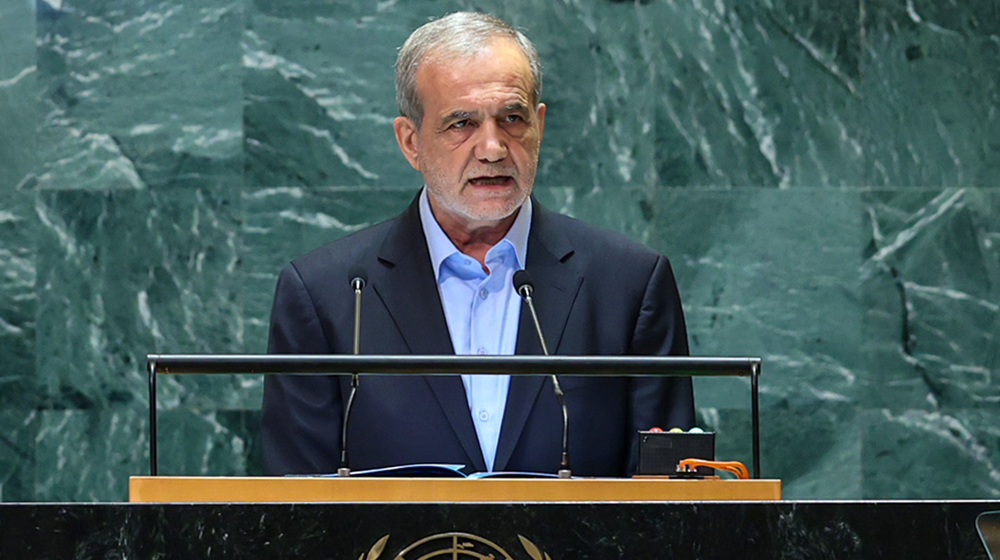
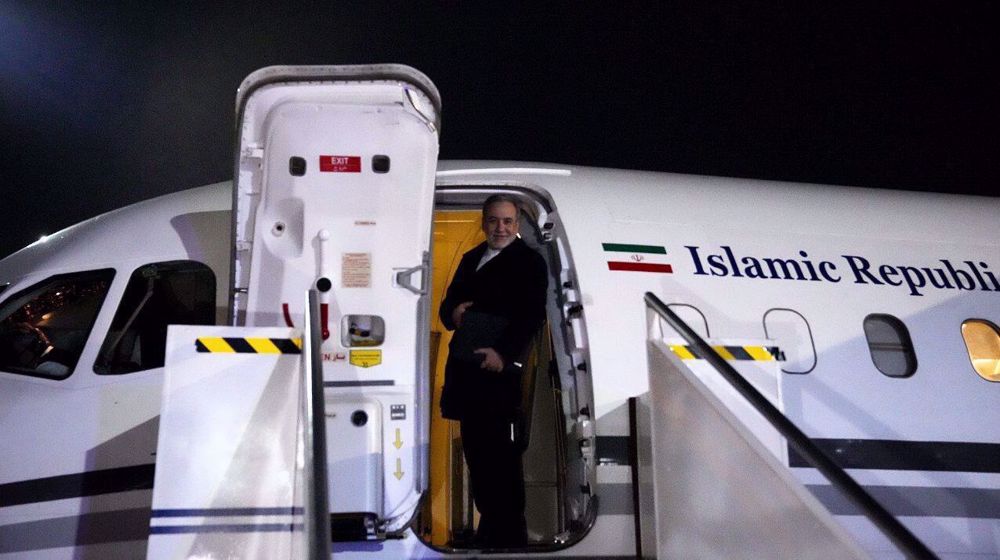
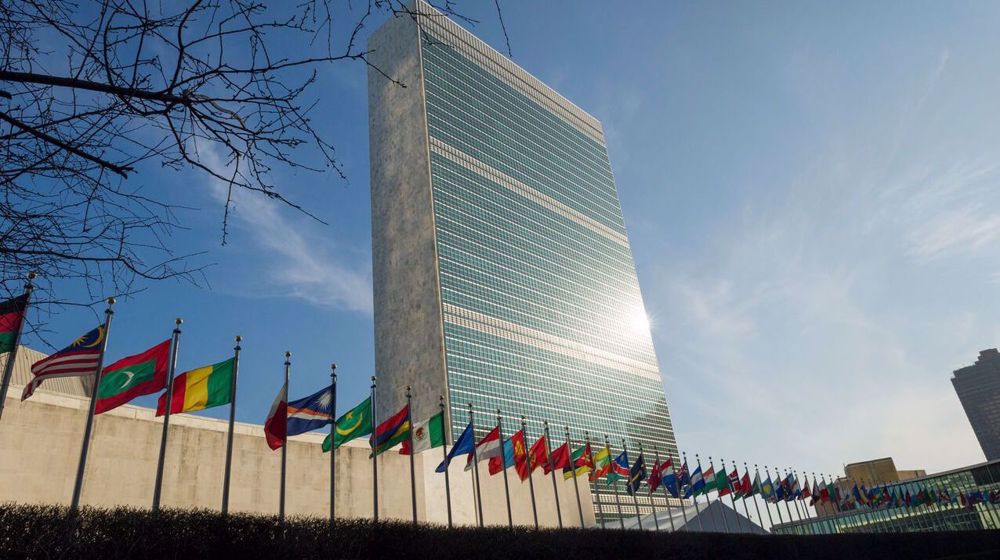
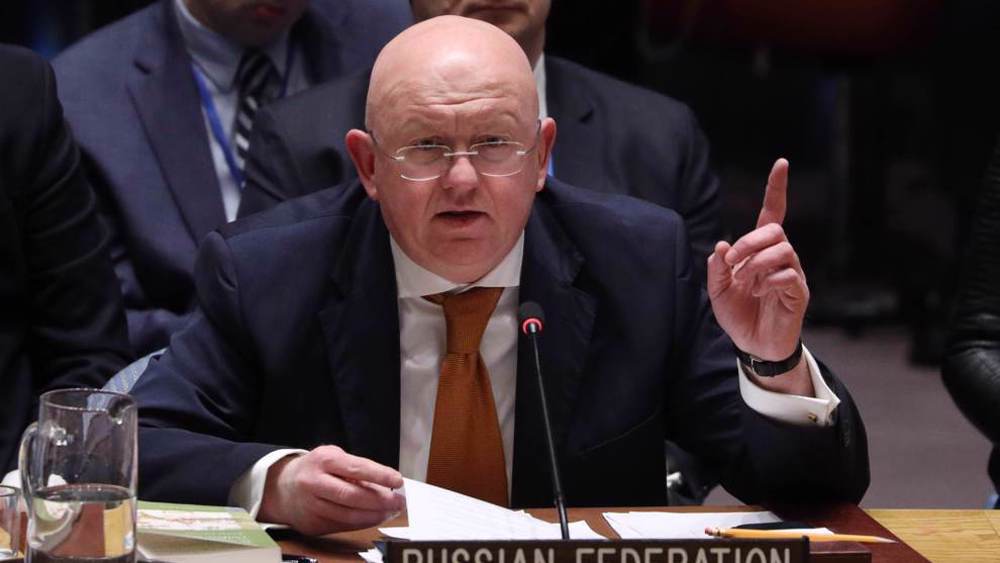



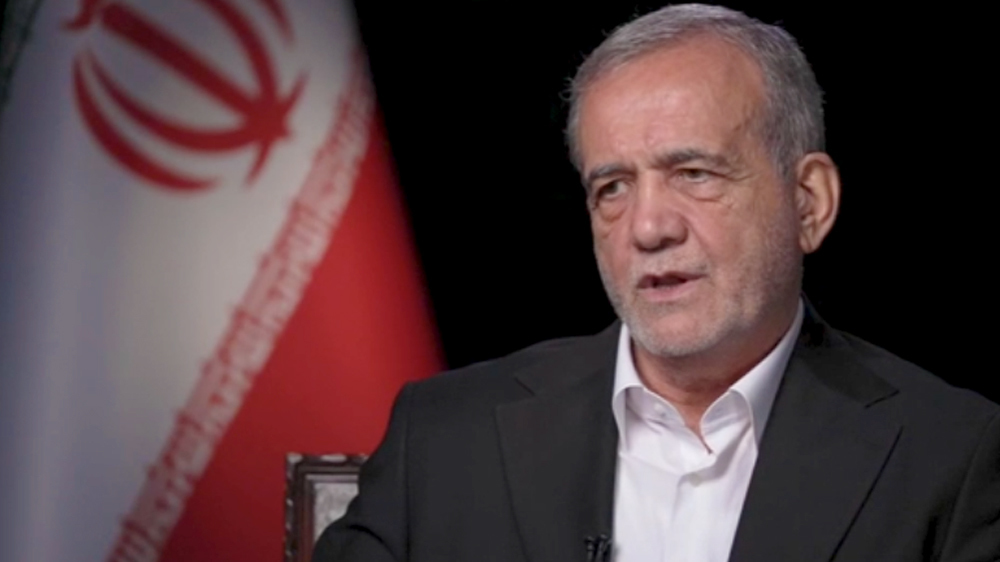
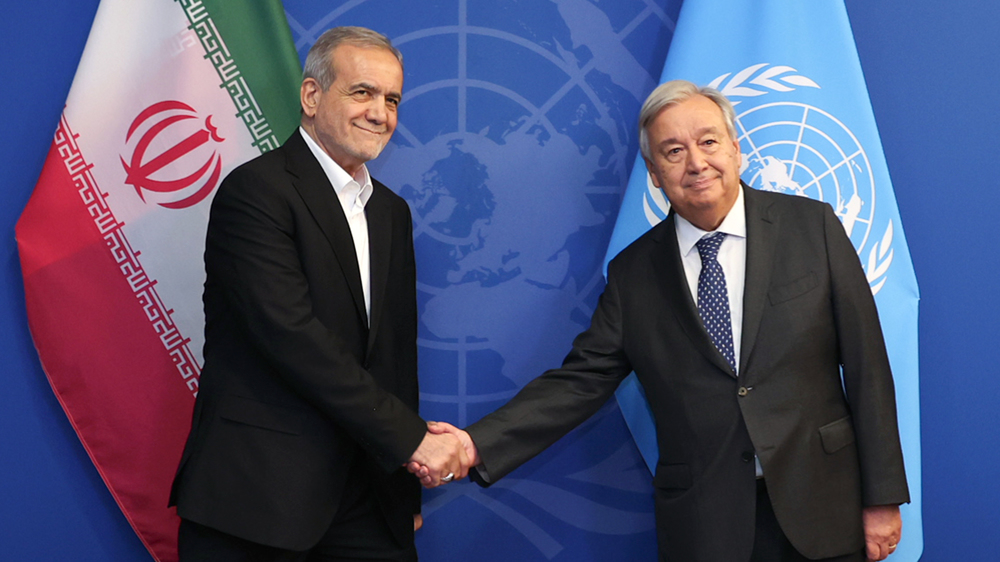
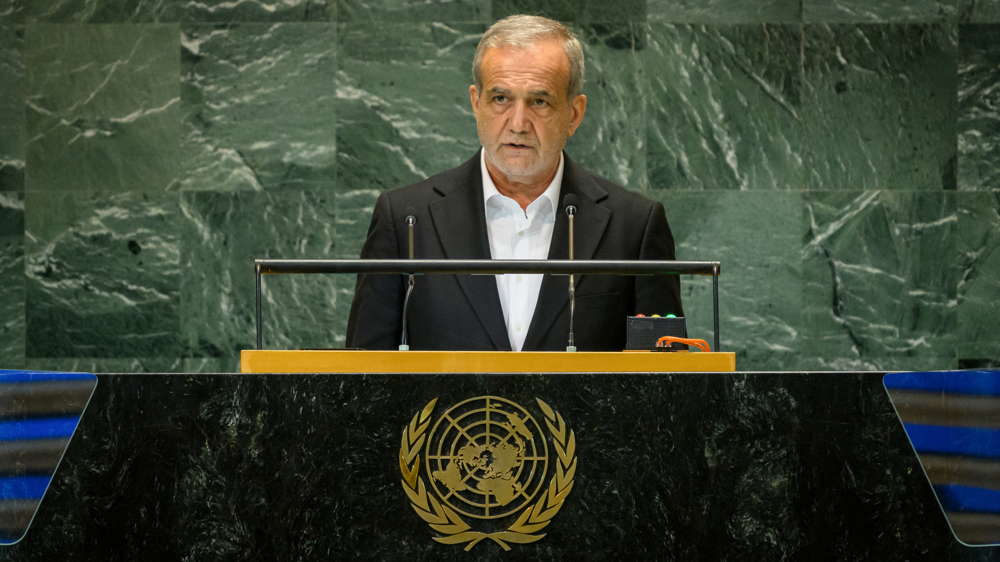

 This makes it easy to access the Press TV website
This makes it easy to access the Press TV website